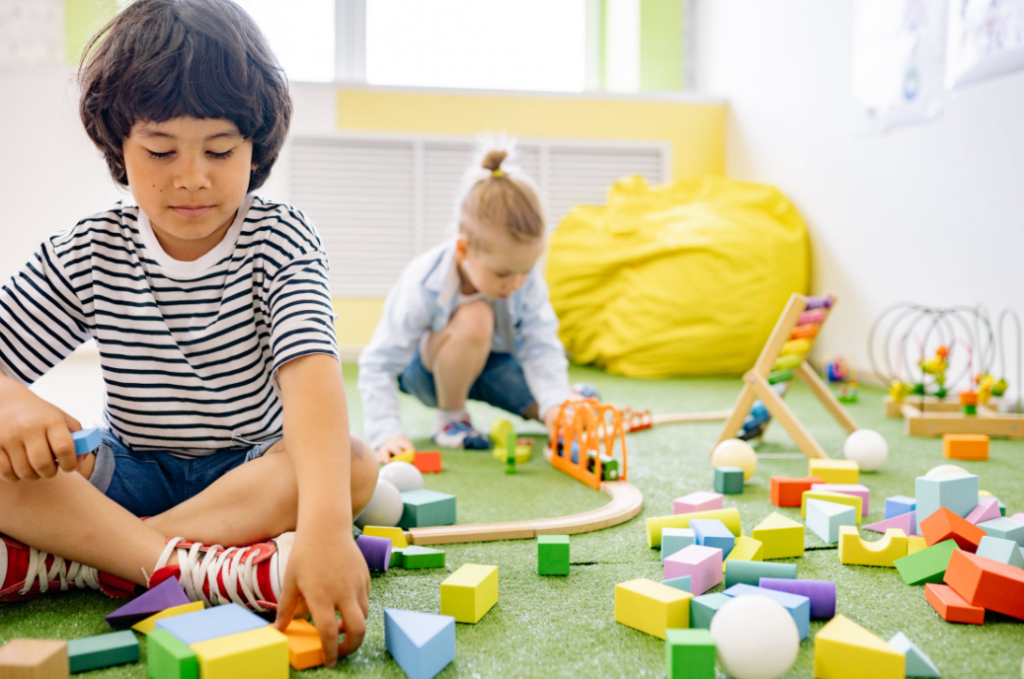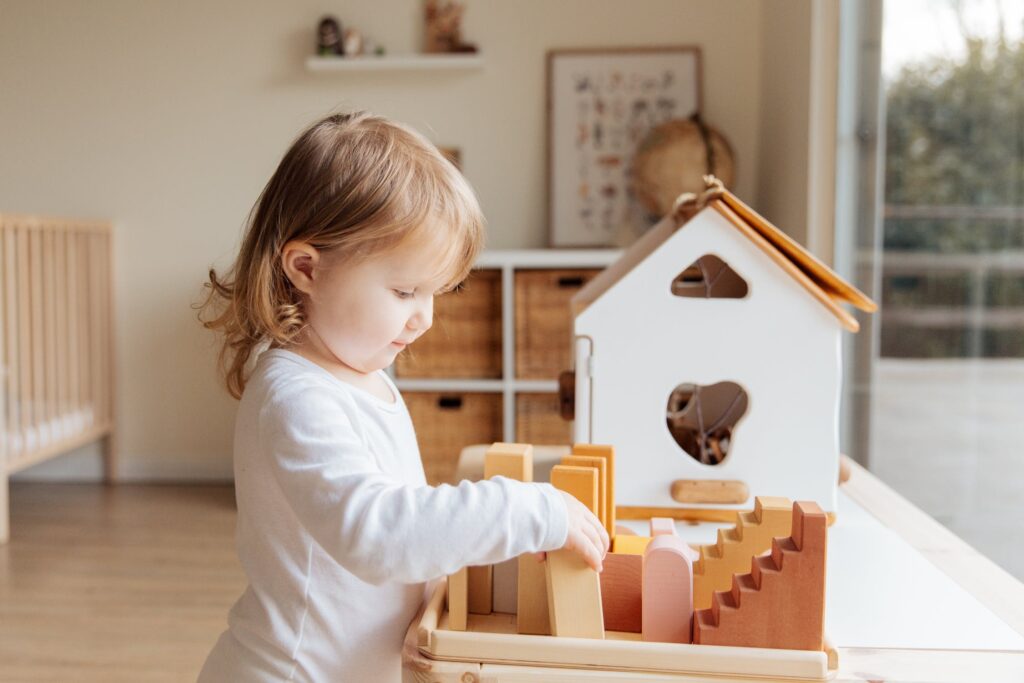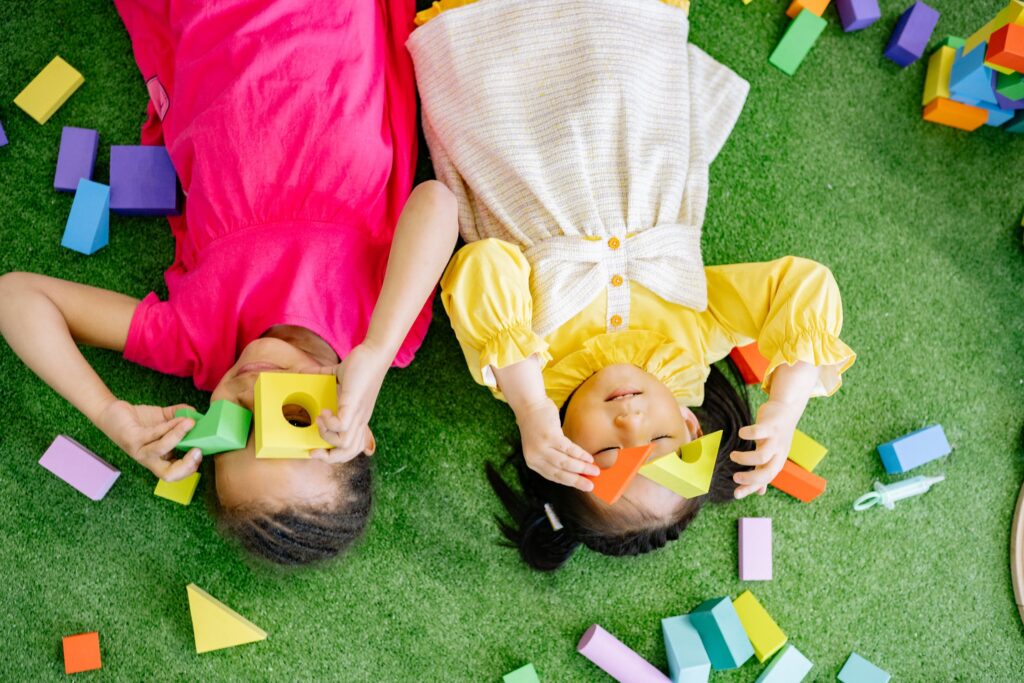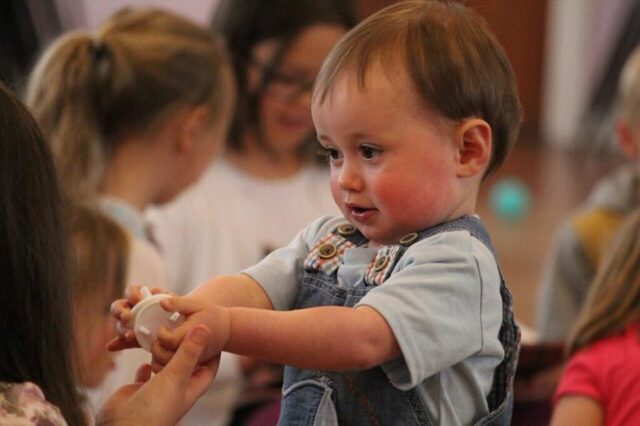There are many benefits to having an only child, but there is also a lot of pressure. Here’s how you can help your only child feel loved and supported by playing with them like they have siblings.
When an only child gets bored, they might find it difficult to play with other children. Here are some suggestions on how to keep them entertained. Read more in detail here: what to do when you’re an only child and bored.
My three-year-old daughter is constructing a skyscraper out of blocks. She’s completely engaged in the tedious task of choosing, stacking, and balancing them in order to build the highest tower possible. She narrates to herself while she plays in her own small bubble, with no interruptions.
I frequently ponder how different this scenario would be if she had siblings. A toddler gazing in awe and then taking some of the blocks to build their own tower, a baby reaching out to destroy it. There may be more disagreement and disputes, but there would also be collaboration, learning to share, and sharing the pleasure of playing together, in my fantasy.
In our new socially isolated society, I’m more conscious than ever of the amount of time my kid spends alone. As the number of single-parent households grows, more parents are finding themselves in a similar position. Is it true, however, that only youngsters are losing out on the joys of play? Could the independence of being without siblings really be beneficial to them? Is there anything we, as parents, can do to help them acquire the abilities they’d learn from playing with a sibling?
Is there a sickness that affects just children?

Granville Stanley Hall, a pioneering American psychologist, said more than a century ago that being an only child was “a sickness in itself.” It was difficult to change the image of only children as being disadvantaged, lonely, and odd. Thankfully, a slew of recent research have debunked his claims.
Toni Falbo, an educational psychologist at the University of Texas, conducted a study of 115 research on only children in the 1980s. She discovered that there was no difference in developmental outcomes between only children, firstborns, and individuals from small households. In fact, only children outperformed other family sizes in terms of character and were more likely to have a good connection with their parents.
While this is comforting to know, we can’t deny that playing as an only kid is quite different than playing with siblings. Often, brothers and sisters are a child’s first playmates. Playing with their younger siblings allows older siblings to put their leadership abilities to the test and learn how to handle disputes. They often play translators, attempting to decipher their siblings’ early efforts at language development and therefore pushing them to practice new sounds in order to be understood.
At a younger age, younger siblings are exposed to a variety of various types of play. Imitating their siblings and sisters helps children develop theory of mind (the capacity to imagine oneself in another’s shoes) and even promotes enhanced motor and coordination abilities, such as learning to walk at an earlier age.
The ability to play alone

When, there is undeniably a lot to be gained by having the flexibility to play whenever and however you choose. Only children don’t have to compete for attention, share toys, or worry about another kid squashing the playdough person they just made.
My daughter has my husband and me to scaffold and assist her in her play, and she has lots of eager playmates and instructors in the shape of grandparents, aunts, uncles, and even our springer spaniel. We’re not constrained by a younger child’s constant feeding, changing, and sleeping schedule, or by an older sibling’s daily school runs. Instead, we may collaborate to build new experiences. I make an effort to pursue her interests and provide her with the time and tools she needs to sort things out on her own.
But I’m still concerned that she’s losing out on the priceless experience of being a sister. Without my brother and sister, I can’t picture my childhood. Would I have created comparable memories by myself, pretending to host our own radio programs and recorded them onto cassettes, having water fights and creating mud pie cafés in the yard, hiding out in dens in the bunk beds?
Perhaps not, but there are methods to help an only kid acquire some of the skills that socializing with a brother or sister can offer.
6 methods to encourage an only kid to act as though he or she has a sibling

- Encourage them to socialize and play with other kids their age. Structured settings such as infant classes, playgroups, and nurseries help to narrow the gap, while playing with friends at home or on vacation comes closer to replicating the intimate interaction that a kid would have with a sibling. It’s about understanding the daily give-and-take that comes with bargaining, sharing, and connecting with other kids.
- Model good behavior and lead by example in terms of sharing, compromising, and showing respect for others. Learning how to respond while waiting for a turn, losing a game, or joining a group are all examples of how to do so.
- Keep in mind that you are their most important instructor. Give them your undivided attention, observe how they play, and assist them in building on their experience by asking questions or offering resources.
- Participate in real-life activities and tasks with your kid. Kneading bread dough, topping pizzas, and putting clothes away are just a few instances of ways kids may assist and feel involved in what you’re doing while pretending to be an adult.
- Encourage chaos, laughing, and a lack of seriousness. When solely living with grownups, only children may get used to a more organized, peaceful daily routine. Our dog, for example, causes a lot of havoc by knocking over toys and barking at strange sounds while simultaneously teaching my daughter how to care for another live thing.
- Make a relationship with the natural world. Bug hunts, seed planting, and searching for indications of the changing seasons are all great ways for your kid to engage in natural play while also teaching them that the world is larger than them.
Children are the most natural playmates. Having siblings is like having playmates for life when their connections are good and they get along. It’s a unique combination of intimacy and irritation that teaches youngsters about relationships from a young age. Only children may not have this, but as parents, we can teach them many of the skills they would learn from siblings just by paying attention, being present with them, and giving them with a variety of play opportunities at home and elsewhere.
The only child problems in adulthood is a problem that many only children face. There are a few ways to help an only child feel like they have siblings.
Frequently Asked Questions
How do I help my only child play alone?
Many parents worry that their children will get bored playing games by themselves, but it is important to remember that a childs imagination and creativity are at their peak when they play alone.
How do you comfort an only child?
There are many different ways to comfort an only child. One way is to be there for them when they need you, but also to give them space and let them know that you will always be there for them if needed. Another way is to make sure that your child has a lot of friends and family members in their life that can help them through tough times.
How do you socialize an only child?
You can socialize by going to school, playing with friends, and joining clubs.




